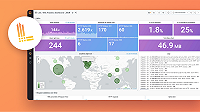Caution
Grafana Agent has reached End-of-Life (EOL) on November 1, 2025. Agent is no longer receiving vendor support and will no longer receive security or bug fixes. Current users of Agent Static mode, Agent Flow mode, and Agent Operator should proceed with migrating to Grafana Alloy. If you have already migrated to Alloy, no further action is required. Read more about why we recommend migrating to Grafana Alloy.
Important: This documentation is about an older version. It's relevant only to the release noted, many of the features and functions have been updated or replaced. Please view the current version.
otelcol.receiver.opencensus
otelcol.receiver.opencensus accepts telemetry data via gRPC or HTTP
using the OpenCensus format and
forwards it to other otelcol.* components.
NOTE:
otelcol.receiver.opencensusis a wrapper over the upstream OpenTelemetry Collectoropencensusreceiver from theotelcol-contribdistribution. Bug reports or feature requests will be redirected to the upstream repository, if necessary.
Multiple otelcol.receiver.opencensus components can be specified by giving them
different labels.
Usage
otelcol.receiver.opencensus "LABEL" {
output {
metrics = [...]
logs = [...]
traces = [...]
}
}Arguments
otelcol.receiver.opencensus supports the following arguments:
cors_allowed_origins are the allowed CORS origins for HTTP/JSON requests.
An empty list means that CORS is not enabled at all. A wildcard (*) can be
used to match any origin or one or more characters of an origin.
The “endpoint” parameter is the same for both gRPC and HTTP/JSON, as the protocol is recognized and processed accordingly.
To write traces with HTTP/JSON, POST to [address]/v1/trace. The JSON message format parallels the gRPC protobuf format. For details, refer to its OpenApi specification.
Note that max_recv_msg_size, read_buffer_size and write_buffer_size are formatted in a way so that the units are included
in the string, such as “512KiB” or “1024KB”.
Blocks
The following blocks are supported inside the definition of
otelcol.receiver.opencensus:
The > symbol indicates deeper levels of nesting. For example, grpc > tls
refers to a tls block defined inside a grpc block.
tls block
The tls block configures TLS settings used for a server. If the tls block
isn’t provided, TLS won’t be used for connections to the server.
The following arguments are supported:
If the server doesn’t support TLS, the tls block must be provided with the
insecure argument set to true. To disable tls for connections to the
server, set the insecure argument to true.
If reload_interval is set to "0s", the certificate will never be reloaded.
The following pairs of arguments are mutually exclusive and cannot both be set simultaneously:
ca_pemandca_filecert_pemandcert_filekey_pemandkey_file
keepalive block
The keepalive block configures keepalive settings for connections to a gRPC
server.
keepalive doesn’t support any arguments and is configured fully through inner
blocks.
server_parameters block
The server_parameters block controls keepalive and maximum age settings for gRPC
servers.
The following arguments are supported:
enforcement_policy block
The enforcement_policy block configures the keepalive enforcement policy for
gRPC servers. The server will close connections from clients that violate the
configured policy.
The following arguments are supported:
output block
The output block configures a set of components to forward resulting
telemetry data to.
The following arguments are supported:
The output block must be specified, but all of its arguments are optional. By
default, telemetry data is dropped. To send telemetry data to other components,
configure the metrics, logs, and traces arguments accordingly.
Exported fields
otelcol.receiver.opencensus does not export any fields.
Component health
otelcol.receiver.opencensus is only reported as unhealthy if given an invalid
configuration.
Debug information
otelcol.receiver.opencensus does not expose any component-specific debug
information.
Example
This example forwards received telemetry data through a batch processor before finally sending it to an OTLP-capable endpoint:
otelcol.receiver.opencensus "default" {
cors_allowed_origins = ["https://*.test.com", "https://test.com"]
endpoint = "0.0.0.0:9090"
transport = "tcp"
max_recv_msg_size = "32KB"
max_concurrent_streams = "16"
read_buffer_size = "1024KB"
write_buffer_size = "1024KB"
include_metadata = true
tls {
cert_file = "test.crt"
key_file = "test.key"
}
keepalive {
server_parameters {
max_connection_idle = "11s"
max_connection_age = "12s"
max_connection_age_grace = "13s"
time = "30s"
timeout = "5s"
}
enforcement_policy {
min_time = "10s"
permit_without_stream = true
}
}
output {
metrics = [otelcol.processor.batch.default.input]
logs = [otelcol.processor.batch.default.input]
traces = [otelcol.processor.batch.default.input]
}
}
otelcol.processor.batch "default" {
output {
metrics = [otelcol.exporter.otlp.default.input]
logs = [otelcol.exporter.otlp.default.input]
traces = [otelcol.exporter.otlp.default.input]
}
}
otelcol.exporter.otlp "default" {
client {
endpoint = env("OTLP_ENDPOINT")
}
}


